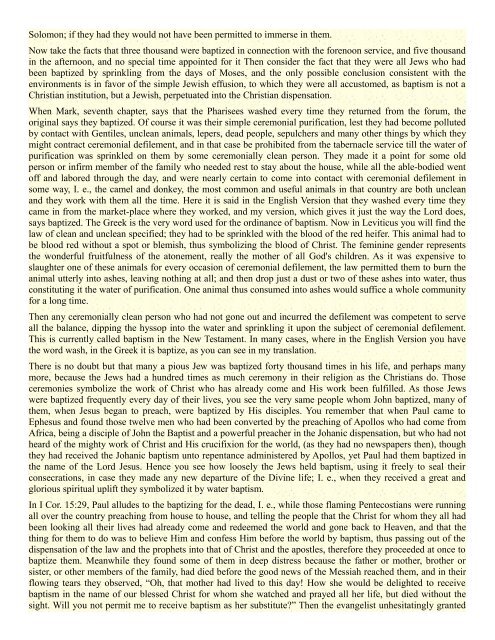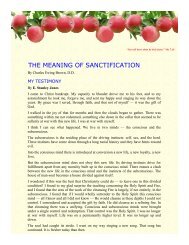W. B. Godbey - Enter His Rest
W. B. Godbey - Enter His Rest
W. B. Godbey - Enter His Rest
You also want an ePaper? Increase the reach of your titles
YUMPU automatically turns print PDFs into web optimized ePapers that Google loves.
Solomon; if they had they would not have been permitted to immerse in them.<br />
Now take the facts that three thousand were baptized in connection with the forenoon service, and five thousand<br />
in the afternoon, and no special time appointed for it Then consider the fact that they were all Jews who had<br />
been baptized by sprinkling from the days of Moses, and the only possible conclusion consistent with the<br />
environments is in favor of the simple Jewish effusion, to which they were all accustomed, as baptism is not a<br />
Christian institution, but a Jewish, perpetuated into the Christian dispensation.<br />
When Mark, seventh chapter, says that the Pharisees washed every time they returned from the forum, the<br />
original says they baptized. Of course it was their simple ceremonial purification, lest they had become polluted<br />
by contact with Gentiles, unclean animals, lepers, dead people, sepulchers and many other things by which they<br />
might contract ceremonial defilement, and in that case be prohibited from the tabernacle service till the water of<br />
purification was sprinkled on them by some ceremonially clean person. They made it a point for some old<br />
person or infirm member of the family who needed rest to stay about the house, while all the able-bodied went<br />
off and labored through the day, and were nearly certain to come into contact with ceremonial defilement in<br />
some way, I. e., the camel and donkey, the most common and useful animals in that country are both unclean<br />
and they work with them all the time. Here it is said in the English Version that they washed every time they<br />
came in from the market-place where they worked, and my version, which gives it just the way the Lord does,<br />
says baptized. The Greek is the very word used for the ordinance of baptism. Now in Leviticus you will find the<br />
law of clean and unclean specified; they had to be sprinkled with the blood of the red heifer. This animal had to<br />
be blood red without a spot or blemish, thus symbolizing the blood of Christ. The feminine gender represents<br />
the wonderful fruitfulness of the atonement, really the mother of all God's children. As it was expensive to<br />
slaughter one of these animals for every occasion of ceremonial defilement, the law permitted them to burn the<br />
animal utterly into ashes, leaving nothing at all; and then drop just a dust or two of these ashes into water, thus<br />
constituting it the water of purification. One animal thus consumed into ashes would suffice a whole community<br />
for a long time.<br />
Then any ceremonially clean person who had not gone out and incurred the defilement was competent to serve<br />
all the balance, dipping the hyssop into the water and sprinkling it upon the subject of ceremonial defilement.<br />
This is currently called baptism in the New Testament. In many cases, where in the English Version you have<br />
the word wash, in the Greek it is baptize, as you can see in my translation.<br />
There is no doubt but that many a pious Jew was baptized forty thousand times in his life, and perhaps many<br />
more, because the Jews had a hundred times as much ceremony in their religion as the Christians do. Those<br />
ceremonies symbolize the work of Christ who has already come and <strong>His</strong> work been fulfilled. As those Jews<br />
were baptized frequently every day of their lives, you see the very same people whom John baptized, many of<br />
them, when Jesus began to preach, were baptized by <strong>His</strong> disciples. You remember that when Paul came to<br />
Ephesus and found those twelve men who had been converted by the preaching of Apollos who had come from<br />
Africa, being a disciple of John the Baptist and a powerful preacher in the Johanic dispensation, but who had not<br />
heard of the mighty work of Christ and <strong>His</strong> crucifixion for the world, (as they had no newspapers then), though<br />
they had received the Johanic baptism unto repentance administered by Apollos, yet Paul had them baptized in<br />
the name of the Lord Jesus. Hence you see how loosely the Jews held baptism, using it freely to seal their<br />
consecrations, in case they made any new departure of the Divine life; I. e., when they received a great and<br />
glorious spiritual uplift they symbolized it by water baptism.<br />
In I Cor. 15:29, Paul alludes to the baptizing for the dead, I. e., while those flaming Pentecostians were running<br />
all over the country preaching from house to house, and telling the people that the Christ for whom they all had<br />
been looking all their lives had already come and redeemed the world and gone back to Heaven, and that the<br />
thing for them to do was to believe Him and confess Him before the world by baptism, thus passing out of the<br />
dispensation of the law and the prophets into that of Christ and the apostles, therefore they proceeded at once to<br />
baptize them. Meanwhile they found some of them in deep distress because the father or mother, brother or<br />
sister, or other members of the family, had died before the good news of the Messiah reached them, and in their<br />
flowing tears they observed, “Oh, that mother had lived to this day! How she would be delighted to receive<br />
baptism in the name of our blessed Christ for whom she watched and prayed all her life, but died without the<br />
sight. Will you not permit me to receive baptism as her substitute?” Then the evangelist unhesitatingly granted









